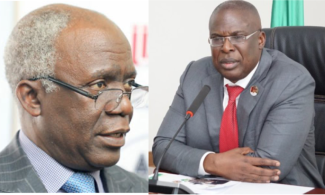
The Chairman of Alliance on Surviving Covid 19 and Beyond (ASCAB), a group led by human rights lawyer, Femi Falana (SAN), has faulted the Minister of State for Petroleum Resources, Chief Timipre Sylva, for saying that the Nigerian government has no power to fix the prices of fuel, kerosene and cooking gas.
Sylva on Monday said that the Nigerian government has no powers to intervene in the rising price of household kerosene because it has been deregulated, adding that it is not necessarily within the purview of the government but a commercial decision as companies now import and sell kerosene at a commercial rate.
Reacting to the minister’s claim, Falana, a Senior Advocate of Nigeria, in a statement he signed on behalf of ASCAB as its Chairman, said “the purported deregulation of the product was illegally pushed out by the (President Muhammadu) Buhari administration”.
Falana noted that the minister made the claim at a media briefing in Abuja to discuss the achievements of the Buhari administration in the petroleum industry since his assumption of office in 2015, pointing out that the price of kerosene had already been deregulated and could no longer be controlled by the government.
Falana, however, noted, “It is common knowledge that the Federal Government, through the NNPC, is the sole importer of fuel into the country, claiming to be subsidising the product. So how can the Federal Government turn round to allow private companies or the so-called market forces to fix the price of the same product?”
Falana noted that in July 2020, Chief Sylva said that an alternative source of fuel, Compressed Natural Gas (CNG) would cost between N95 to N97 per litre, to make fuel more affordable in the country.
He said, “About a year later, it was disclosed by the Minister that as part of efforts to ensure that the autogas conversion of vehicles yielded the desired results, the Federal Government had set aside N250 billion for willing investors in autogas assembly plants in the country. The Federal Government should tell Nigerians why the migration from PMS to CNG has been abandoned.
“However, contrary to Chief Sylva's claim, the Federal Government is legally obligated by the combined effect of section 4 of the Price Control Act and section 316 of the Petroleum Industry Act to determine and fix the prices of petroleum products including petrol motor spirit, kerosene and cooking gas. In Aberuagba v Attorney-General of Ogun State the Supreme Court held:
"Furthermore, item 61(e) empowers the Federation to control the prices of goods and commodities. Under the Price Control Act 1977 and the Price Control Commodities Order 22 of 1979, the Federal Government has controlled the prices of petrol, diesel oil and petroleum products. I have earlier shown that the Act and the Order are existing laws."
He added, “In Bamidele Aturu v Minister of Petroleum Resources and the Attorney General of The Federation (Suit No FHC/ABJ/CS/591/2009), Justice M. Bello declared the policy of deregulation of the downstream sector of the petroleum industry to be unconstitutional, illegal, null and void.
“Consequently, the Court ordered the defendants, their agents, privies, collaborators and whosoever and howsoever to desist from failing to fix the prices of petroleum products as mandatorily required by the Petroleum Act and the Price Control Act. The Court further ordered the government to fix and publish regularly the prices of petroleum products.
“In view of the clear statutory provisions and decided cases on the illegality of the deregulation of any aspect of the petroleum industry the Federal Government should stop subjecting the Nigerian people to an excruciating economic crisis by allowing the so-called market forces to determine and fix the prices of petroleum products in the country.
“We call on President Muhammadu Buhari, as the Minister of Petroleum Resources, to call Chief Sylva to order for treating the valid and subsisting judgments of the Federal High Court and the Supreme Court with contempt. Otherwise, we shall not hesitate to commence contempt proceedings against the public officers in charge of the petroleum industry.”